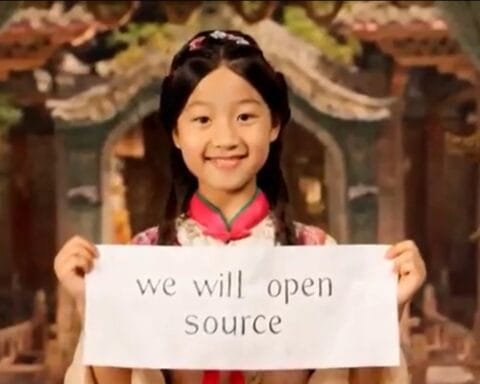Last Updated on June 11, 2024 2:15 pm by Laszlo Szabo / NowadAIs | Published on June 11, 2024 by Laszlo Szabo / NowadAIs
Apple Intelligence: The Future of AI on iPhones, iPads and Macs – Key Notes
- Apple unveils “Apple Intelligence,” a comprehensive AI system integrated across its devices and services
- Leverages large language models, including a partnership with OpenAI’s ChatGPT, for enhanced capabilities
- Focuses on privacy and security, with on-device processing and “Private Cloud Compute” for complex tasks
- Introduces new AI-powered features like Writing Tools, Image Playground, Genmoji, and an upgraded Siri
- Aims to bring generative AI to the mainstream, potentially shaping the future of how we interact with our devices
The Rise of Apple Intelligence
In a move that has sent shockwaves through the tech industry, Apple has finally joined the race to integrate generative artificial intelligence (AI) into its ecosystem. Dubbed “Apple Intelligence“, the company’s comprehensive AI strategy promises to change the way we engage with our iPhones, iPads, and Macs forever.
For years, Apple has been known for its cautious approach to emerging technologies, preferring to refine and perfect its offerings rather than rushing to be first. However, the rapid advancements in generative AI, spearheaded by the likes of OpenAI’s ChatGPT, have compelled the tech giant to step up its game.
Leveraging Partnerships and On-Device Processing
very happy to be partnering with apple to integrate chatgpt into their devices later this year!
think you will really like it.
— Sam Altman (@sama) June 10, 2024
At the heart of Apple Intelligence lies a strategic partnership with OpenAI, the creators of the ChatGPT language model. This collaboration allows Siri, Apple’s virtual assistant, to tap into the vast knowledge and capabilities of ChatGPT, enabling it to handle more complex queries and tasks.
Recognizing the importance of privacy and security, Apple has designed its AI system to prioritize on-device processing whenever possible. This approach, known as “Private Cloud Compute”, ensures that user data never leaves the device, even for more complex requests that require server-side processing. The company has also committed to allowing independent experts to verify the privacy-preserving nature of its cloud-based AI models.
Transforming the User Experience
Apple Intelligence’s impact will be felt across a wide range of Apple’s products and services. One of the most important enhancements is the revamped Siri, which now boasts a more natural and conversational interface, as well as the ability to understand context and carry out actions across multiple apps.
The Writing Tools feature, integrated throughout Apple’s ecosystem, empowers users to enhance their written communications. From proofreading and tone adjustment to summarization and rewriting, these AI-powered tools promise to streamline the writing process and elevate the quality of our digital correspondence.
Images with Generative AI
Apple’s foray into generative AI extends beyond productivity-focused features. The company has introduced the “Image Playground”, a tool that allows users to create unique, AI-generated images and animations directly within their apps. This feature, combined with the new “Genmoji” capability, which generates personalized emoji-like reactions, opens up a world of creative expression.
The integration of ChatGPT into Apple’s ecosystem also unlocks new possibilities for users. Whether it’s generating poetry, brainstorming ideas, or tackling complex queries, the powerful language model can be seamlessly accessed through Siri and the company’s writing tools.
Prioritizing Privacy and Security
As Apple ventures into the realm of generative AI, it has placed a strong emphasis on safeguarding user privacy and data security. The company’s “Private Cloud Compute” approach ensures that sensitive information never leaves the user’s device, even when processing more complex requests.
Moreover, Apple has committed to allowing independent experts to audit the code running on its servers, further reinforcing its commitment to transparency and accountability. This focus on privacy-preserving AI aligns with the company’s long-standing reputation for prioritizing user trust and data protection.
Bridging the Gap Between Platforms
One of the most anticipated features of Apple Intelligence is the integration of Rich Communication Services (RCS) into the Messages app. This long-overdue move will finally bridge the gap between iPhone and Android users, allowing for higher-quality image and video sharing, as well as improved messaging experiences across platforms.
By embracing RCS, Apple is addressing a pain point that has long frustrated users, fostering better cross-platform communication and collaboration. This step not only enhances the user experience but also signals a shift towards greater interoperability in the tech industry.
Empowering Developers with New Possibilities
Apple’s introduction of Apple Intelligence extends beyond the user experience, as it also presents exciting opportunities for developers. The company has unveiled a suite of new App Intents, APIs, and frameworks that make it easier for third-party app creators to integrate advanced AI capabilities into their offerings.
This move opens the door for a new wave of innovative applications that leverage the power of generative AI, from personalized productivity tools to immersive creative experiences. Developers can now tap into the same AI resources that power Apple’s own features, further enhancing the capabilities of the Apple ecosystem.
Siri’s Transformation
The revamped Siri is perhaps the most visible manifestation of Apple Intelligence, showcasing the company’s commitment to transforming its virtual assistant into a more capable and intuitive interface. With enhanced language understanding, the ability to handle complex queries, and seamless integration across apps, Siri is poised to become a more integral part of the Apple experience.
Beyond the improved conversational abilities, Siri’s newfound awareness of on-screen content and the ability to take actions in and across apps represents a significant step forward. Users can now leverage Siri to perform tasks that were previously cumbersome or required manual intervention, further streamlining their interactions with their Apple devices.
Navigating the Challenges Ahead
As Apple ventures into the realm of generative AI, it faces a delicate balancing act. While the company’s emphasis on privacy and security is commendable, the cost of running powerful AI models and managing the potential for misinformation and fabrication presents new challenges.
Apple’s traditionally cautious approach, which has prioritized polished and controlled user experiences, may need to evolve to accommodate the dynamic nature of generative AI. Navigating this transition will require a careful consideration of the trade-offs between innovation and the company’s renowned attention to detail.
The Future of Apple Intelligence
The introduction of Apple Intelligence marks a pivotal moment in the company’s history, as it embraces the transformative potential of generative AI. By leveraging partnerships, on-device processing, and a steadfast commitment to privacy, Apple aims to bring this cutting-edge technology to the mainstream, shaping the future of how we interact with our digital devices.
As the tech industry continues to race towards the frontiers of AI, Apple’s strategic move positions it as a formidable player, ready to redefine the user experience and empower developers to push the boundaries of what’s possible. The journey ahead may not be without its challenges, but the promise of Apple Intelligence suggests an exciting and transformative future for Apple’s ecosystem.
Definitions
- Apple Intelligence: A comprehensive AI system integrated across Apple devices and services, leveraging generative AI and large language models to enhance user experience.
- Apple: A multinational technology company known for its innovative hardware, software, and services, including the iPhone, iPad, and Mac.
- Siri: Apple’s virtual assistant that uses voice recognition and natural language processing to assist users with tasks and information.
- Private Cloud Compute: An approach that prioritizes on-device processing to ensure user data privacy, with server-side processing handled securely and transparently.
- Rich Communication Services (RCS): A communication protocol aimed at replacing SMS, offering enhanced messaging features like high-quality media sharing and read receipts.
- App Intent: APIs and frameworks that allow developers to integrate advanced AI capabilities into their applications.
- API: Application Programming Interface, a set of protocols and tools for building software and applications.
- Genmoji: A feature that generates personalized emoji-like reactions using AI.
- Image Playground: A tool for creating unique AI-generated images and animations within Apple apps.
Frequently Asked Questions
1. What is Apple Intelligence, and how does it differ from previous AI efforts by Apple?
Apple Intelligence is the company’s comprehensive AI strategy, which integrates generative AI capabilities across its devices and services. Unlike previous AI-powered features, Apple Intelligence leverages large language models, including a partnership with OpenAI’s ChatGPT, to offer enhanced capabilities in areas like writing, image generation, and virtual assistance. The focus on privacy and security, with on-device processing and “Private Cloud Compute,” also sets Apple Intelligence apart from its predecessors.
2. How will Apple Intelligence impact the user experience on Apple devices?
Apple Intelligence will transform the user experience in numerous ways. The revamped Siri will become more conversational and capable of handling complex queries, while Writing Tools will enhance digital communication through features like proofreading, tone adjustment, and summarization. The introduction of the Image Playground and Genmoji will unlock new creative possibilities, and the integration of Rich Communication Services (RCS) in Messages will improve cross-platform messaging.
3. What are the key privacy and security measures implemented in Apple Intelligence?
Privacy and security are at the forefront of Apple Intelligence. The system prioritizes on-device processing whenever possible, ensuring that user data never leaves the device. For more complex tasks that require server-side processing, Apple has developed “Private Cloud Compute,” which allows independent experts to verify the privacy-preserving nature of the cloud-based AI models. This commitment to transparency and accountability underscores Apple’s dedication to protecting user data.
4. How will Apple Intelligence impact the developer ecosystem?
Apple Intelligence presents exciting opportunities for developers. The company has introduced new App Intents, APIs, and frameworks that make it easier for third-party app creators to integrate advanced AI capabilities into their offerings. This empowers developers to leverage the same AI resources that power Apple’s own features, opening the door for a new wave of innovative applications that leverage the power of generative AI.
5. What are the potential challenges and considerations for Apple as it navigates the world of generative AI?
As Apple ventures into the realm of generative AI, it faces a delicate balancing act. While the company’s emphasis on privacy and security is commendable, the cost of running powerful AI models and managing the potential for misinformation and fabrication presents new challenges. Apple’s traditionally cautious approach, which has prioritized polished and controlled user experiences, may need to evolve to accommodate the dynamic nature of generative AI. Navigating this transition will require a careful consideration of the trade-offs between innovation and the company’s renowned attention to detail.









